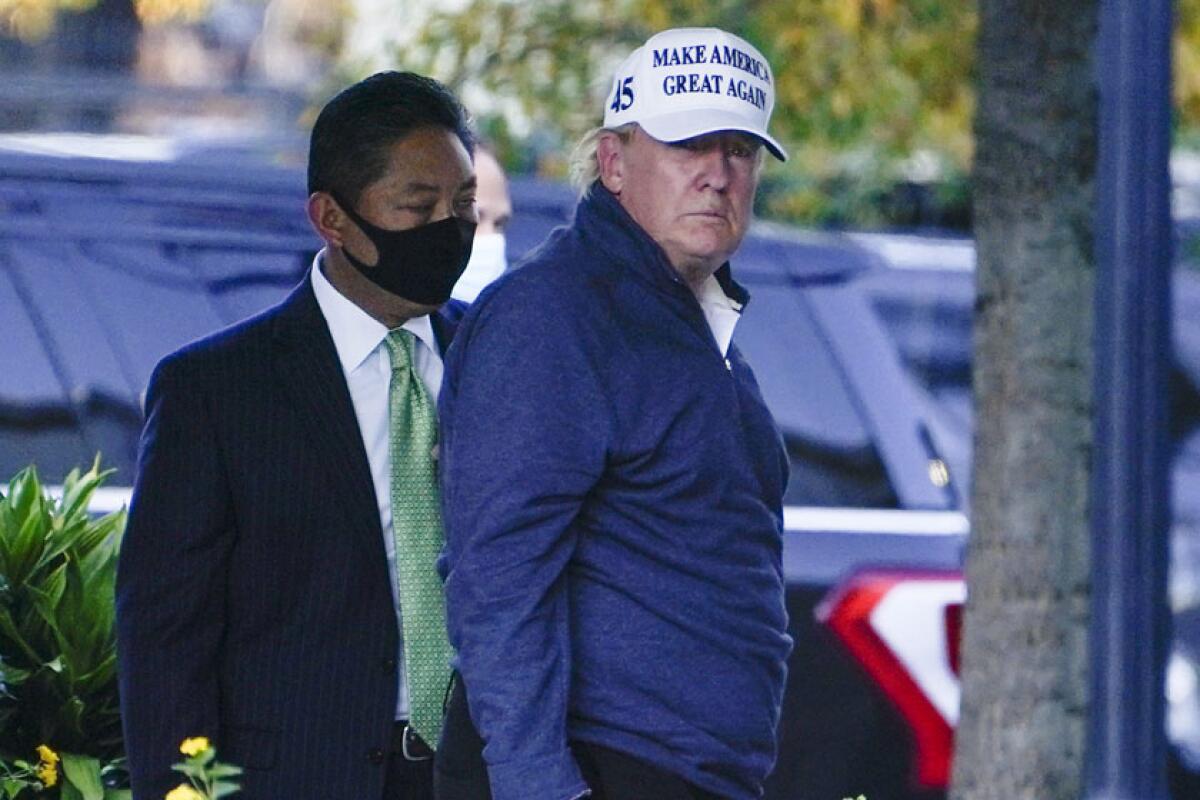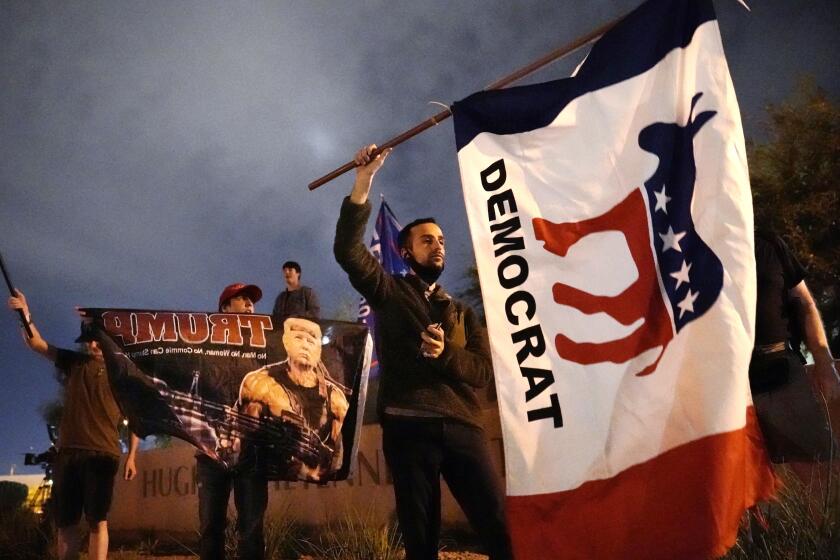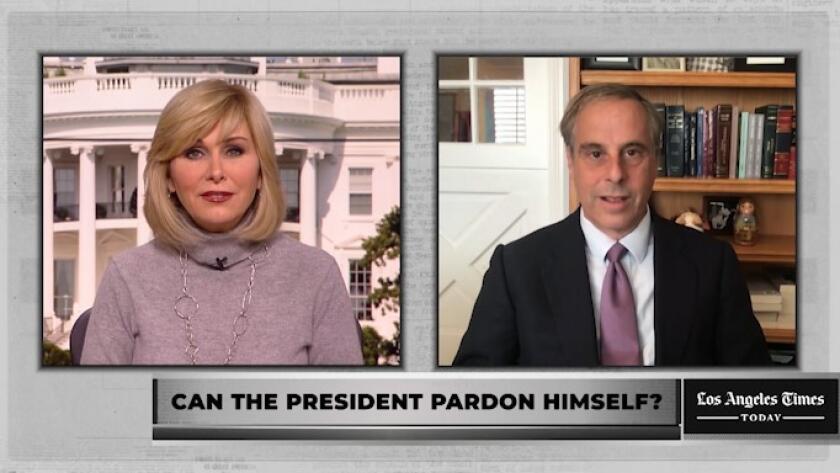Column: Can Trump self-pardon? He can try...

Among the questions suddenly brought to the fore by Joe Biden’s victory is this constitutional brainteaser: Can President Trump pardon himself?
The short answer is probably not. But before I explain that, we need to contend with a number of preliminary issues.
Start here: If Trump tries a self-pardon, don’t expect a full answer on the question of its legality any time in the next four years. That’s because a final determination would have to be made by the courts.
First, Trump would have to issue himself a pardon — not unlikely but also not certain — then Biden and his attorney general would have to decide to prosecute Trump on one or another federal crime (something they would not do unless they had concluded that self-pardon would prove to be unconstitutional). Ultimately, a federal indictment would send the matter on its way to the Supreme Court.
It’s entirely possible, of course, that Trump has committed federal crimes in the last four years, but would any of them rise to a level that would cause Biden to put the country through the convulsions that a criminal trial of the former president would entail? It would deeply aggravate partisan wounds, as well as threaten Biden’s already tenuous political position as president of all the people. Biden is a healer who wants to get things done; prosecuting Trump undermines both those goals sharply.
A blue-state Democrat and a red-state Republican discuss the election and the future of the country
Moreover, the federal government needn’t prosecute Trump to secure a modicum of justice for his criminal conduct. Manhattan Dist. Atty. Cyrus Vance Jr. has been developing a criminal investigation of Trump for a welter of state tax, fraud and financial crimes. The investigation is moving forward apace; Vance is likely to reach charging decisions within a few months. And because a president can’t pardon himself (or anyone) for state crimes, his Article II powers would have no effect.
In fact, if Trump is smart, he might stay his hand because last year New York changed its laws just with him in mind. The state’s double jeopardy rules used to prohibit the prosecution of someone for conduct that was the subject of a federal pardon. No longer — expressly because of Trump’s corrupt and pernicious use of the pardon power. Should the president pardon himself, it would be a poke in the eye with a sharp stick in New York, an invitation for Vance to double down.
So now to the constitutional question, which as I say will almost certainly remain academic. It does present a puzzle. It’s a little like the question my Catholic friends used to pose to flummox the nuns: If God is all powerful, can he make a rock so heavy that he himself cannot lift it?
The argument for the ability to self-pardon rests on the unqualified nature of the language in Article II: The president “shall have power to grant reprieves and pardons for offenses against the United States, except in cases of impeachment.”
“It has generally been inferred from the breadth of the constitutional language,” writes legal scholar and retired federal judge Richard A. Posner in a book on Clinton’s impeachment, “that the president can indeed pardon himself.”
But really? A proper constitutional interpretation would have to go much deeper, to our best understanding — historical, legal, cultural — of what a pardon is. Pardon implies a grant of mercy to another. Nothing in the purposes or history of the Constitution’s pardon power can be read to authorize a self-pardon.
Instead, there is very strong basis to read the Article II pardon power as prohibiting self-pardon. Self-pardon flatly contradicts a cardinal principle of Anglo-American law: No person can be a judge in his own cause. A self-pardon indisputably puts the president above the law, a result that would be anathema to the framers and to our legal tradition.
Self-pardon is also undercut by this phrase: “except in cases of impeachment.” If a president could pardon himself, it would conflict with the clear import of these words, which is that criminal prosecution of a president can proceed after an impeachment.
Finally, self-pardon would do violence to the president’s core constitutional responsibility to “take care that the laws be faithfully executed.” Trump’s exempting himself from criminal law would patently fail the “take care” test, and it at least arguably fails the “faithfully” part as well — most scholars contend that word requires executive power to be motivated by some kind of public purpose, as opposed to rank self-dealing. (On these terms, Trump may prove to have been the most faithless president in history.)
Our 45th president famously couldn’t sit still past the 4th Amendment when an advisor tried to read the Constitution to him starting with the Bill of Rights. He probably believes he has the power to pardon himself. He’s wrong, but because his successor will be governed by prudence that Trump wouldn’t understand, he’ll probably never find out.
Watch L.A. Times Today at 7 p.m. on Spectrum News 1 on Channel 1 or live stream on the Spectrum News App. Palos Verdes Peninsula and Orange County viewers can watch on Cox Systems on channel 99.
More to Read
A cure for the common opinion
Get thought-provoking perspectives with our weekly newsletter.
You may occasionally receive promotional content from the Los Angeles Times.












